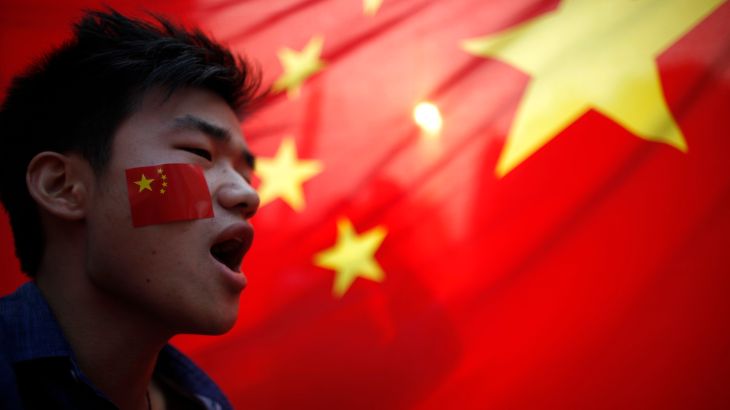Japanese firms suspend work amid protests
Major firms temporarily shut factories and offices in China as protests over disputed islands spread.

Anti-Japan protests have reignited across China, forcing Japanese firms in the country to suspend operations, as a crisis over a territorial dispute escalates on the anniversary of Japan’s pre-war invasion of its neighbour.
As demonstrations continued on Tuesday, China pledged to protect Japanese firms, citizens and property and urged anti-Japan protesters to express themselves in an “orderly, rational and lawful” way.
The pledge came as major Japanese firms closed factories on the mainland and urged expatriate workers to stay indoors after angry protests flared over a group of islands Tokyo calls the Senkaku and Beijing calls the Diaoyu.
Leading Japanese businesses such as car-makers Toyota and Honda were attacked at the weekend, causing them to suspend some of their China operations.
China and Japan have close trade and business ties, with numerous Japanese companies investing in their larger neighbour, and two-way trade totalled $342.9bn last year, according to Chinese figures.
Canon also announced that it would stop production at three of its four Chinese factories on Monday and Tuesday, citing concerns over employees’ safety. Panasonic has taken similar steps at its plants in China.
Toyota, the world’s biggest automaker, declined to offer specifics on shutdowns at its three assembly plants and six other factories in China, saying only that it viewed “employees’ safety to be top priority”.
Honda Motor, which makes about 970,000 vehicles a year in China, said it had closed all five of its plants in the country for Tuesday and Wednesday, while Nissan, which has China as its biggest market, temporarily shut two of three factories.
Fellow autmoaker Mazda Motor Corp will close its Nanjing factory for four days starting on Tuesday.
Uniqlo, the chain of clothing stores owned by Japan’s Fast Retailing, has also said they will close 19 outlets in the People’s Republic on Tuesday. Asia’s largest apparel retailer had previously closed seven outlets on Monday.
Al Jazeera’s Marga Ortigas, reporting from Hong Kong, said that it was not just large companies who were closing their operations, but smaller ones too, in addition to the Japanese embassy which has temporarily shut its doors.
“[China and Japan] have had a love-hate relationship for generations, and what has brought them together in recent years are the economic ties between them,” she said. “The last thing they can afford to do right now is rupture that trade relationship, as both of them rely on it.”
Disputed islands
Relations between Asia’s two biggest economies has faltered badly, with emotions running high on the streets and also out at sea where two Japanese activists landed on an island at the centre of the dispute.
The Japanese nationals landed on one of the islands, Japanese media reported, potentially raising tensions in an area already patrolled by ships from both nations and increasing fears of direct clashes.
Japanese national broadcaster NHK broadcast images of a Japanese fishing vessel, believed to be owned by the nationals, close to the shores of one of the disputed islands.
 |
Japanese Chief Cabinet Secretary, Osamu Fujimura, said in an earlier news conference that the Japanese nationals later returned to their fishing vessel and headed back out to sea.
China’s Foreign Ministry said on Tuesday that the landing of the two people was provocative and that it had complained to Tokyo.
“The unlawful landing of the Japanese right-wingers on the Chinese territory of the Diaoyu islands was a gravely provocative action violating Chinese territorial sovereignty,” ministry spokesman Hong Lei said in a statement.
“We urge Japan to take effective measures to halt all actions that exacerbate conflict. At the same time, China retains the right to take further steps,” he added.
He earlier said it was up to Japan to correct its ways, and that the direction of developments was now in Japan’s hands.
Protests
The ruling Chinese Communist Party has allowed protests to display public anger after Japan’s decision last week to buy from the private former Japanese owner the chain of islands.
The anti-Japanese protests flared in Beijing and other cities on Saturday, when demonstrators besieged the Japanese embassy, hurling stones, eggs and bottles, and testing cordons of anti-riot police.
Speaking to Al Jazeera from Singapore, Tony Nash, managing director of business consultancy IHS, said the sight of Japanese investors, and potentially other investors, removing their investments could have a major effect on China over time, adding that the world was watching how China handles the situation.
“China is an emerging diplomatic global player and as China addresses this issue, I think the world will watch how they handle it,” he told Al Jazeera.
“How they address Japan, how they address the domestic issues around Japanese embassies and commercial interests.
“If China is not perceived as addressing this in a truly diplomatic way, it could really damage their credibility in diplomatic arenas.”
The Japanese government has been warning its citizens about even larger scale protests on Tuesday, when China marks its memorial day for Japan’s war-time occupation of parts of China.
Many in China believe that Japan has not atoned for its actions during and after the invasion, such as the Nanjing Massacre of 1973 and the actions of Unit 731, Japan’s biological warfare unit.